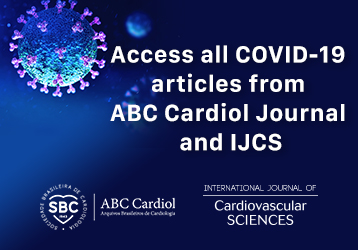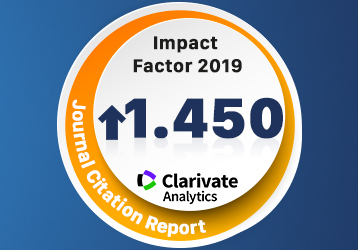Rules and Regulations — Arquivos Brasileiros de Cardiologia
1. Name, Headquarters, Purpose and Duration
1.1. Arquivos Brasileiros de Cardiologia (ABC), the official scientific publication of the Brazilian Society of Cardiology (SBC) shall be governed by these rules and other laws applicable thereto.
1.2. The ABC are part of SBC and have their headquarters in the Host City of the Brazilian Society of Cardiology, and are allowed to set up, shut down or transfer offices, branches and other facilities in any part of Brazil.
1.2.1. The ABC have a branch in the SBC headquarters in São Paulo – SP, which shelters its Memorial and Board Room.
1.3. The purpose of the ABC is:
a) To be the official scientific publication channel of the SBC, aimed at disseminating the scientific contentes of national and international scientific research in the field of cardiovascular diseases.
b) To promote scientific debate in the field of cardiovascular diseases by stimulating the publication of review articles, points of view, editorials and others.
c) To publish, on an exclusive basis, the SBC scientific guidelines and rules.
1.4. The ABC have an undetermined duration.
2. The Boards
The ABC boards:
a) The Editorial Board.
b) The Board of Trustees (ConDArq).
3. The Editorial Board
3.1. The Editorial Board shall consist of:
a) Editor-in-Chief.
b) Editorial Supervisor.
c) Associate Editors.
d) Board Members.
3.1.1. The Editor-in-Chief:
3.1.1.1. The Editor-in-Chief is a medical professional responsible for managing the editorial line of the journal and has the following duties:
a) Approving all materials published in the journal, or those prepared to be included in marketing pages, or in the form of booklets, working with associate editors.
b) Working within the budget approved by the SBC Directors.
c) Taking responsibility for all invitations to publish editorials or review articles.
d) Selecting and maintaining a body of Associate Editors in each field of study.
e) Selecting the Editorial Supervisor.
f) Planning agendas with the journal’s staff and organizing regular meetings with each of the associate editors and the Editorial Board members to ensure communication and integration.
g) Participating in major scientific meetings of the SBC and its affiliates in order to select relevant articles for publication.
h) Representing the ABC in Board meetings of the SBC, whenever called.
i) Attending ConDArq meetings
j) Achieving the qualitative growth targets set by ConDArq.
k) Submitting annual reports of performance to ConDArq.
l) Working with the SBC Commercial Department in fundraising tasks in order to subsidize the journal, by liaising with governmental and non-governmental organizations.
3.1.1.2. The Editor-In-Chief will be chosen through a public selection process.
3.1.1.3. The following are prerequisites for the position of Editor-in-Chief:
a) Having been an SBC member for over 10 years.
b) Having the Title of Specialist in Cardiology and Cardiovascular Surgery and Pediatric Cardiology.
c) Having strong academic qualifications in the field of cardiology, including the title of PhD.
d) Having broad and deep knowledge of cardiovascular medicine, its trends and recent advances.
e) Having demonstrated skills in business administration and leadership.
f) Having experience in writing, editing and proofreading articles for written or electronic publications as well as ability to plan, coordinate and deal with related tasks.
g) Having computer skills, including the ability to deal with new communications technologies and implement advances in the dynamics of the journal. h) Being familiar with the actions taken by the SBC.
i) Having knowledge and experience in scientific methodologies.
j) Having available time to complete related tasks. k) Being free of potential conflicts of interest and/or ethical conflicts that may limit the independence of the editorial process.
3.1.1.4. The selection of the Editor-In-Chief will be conducted by ConDArq through the following actions:
a) Public notice sent to all SBC members by e-mail, and published on the SBC website www.cardiol.br in the first half of the year preceding the expiration of the Editor-In-Chief’s term of office.
b) Receipt and review of résumés and qualifications by a committee appointed by ConDArq. c)
Recruitment will be done through a service agreement.
3.1.1.5. The Editor-In-Chief will be entitled to a monthly pay to be determined by ConDArq taking into account the financial capacity of the Journal.
3.1.1.6. The Editor-In-Chief will report to ConDArq.
3.1.1.7. The Editor-In-Chief may be removed by the SBC Chairman once ConDArq issues its
opinion.
3.1.1.8. The Editor-In-Chief will attend ConDarq meetings without voting rights.
3.1.1.9. The Editor-In-Chief’s term of office will be of 4 years, with one renewal allowed through selection process announced in a public notice.
3.1.1.10. The Editor-in-Chief shall be empowered to determine the editorial content of the journal and the concept of editorial independence shall be defended by the editors. The SBC Directors should not interfere with the assessment, selection or editing of individual manuscripts either directly or by creating na environment that may influence any decisions whatsoever. The editors should base their decisions on the validity of the work and on its importance to the readers, rather than on the commercial success of the journal. The editors should feel free to express critical views, but should take responsibility for all medical
aspects without any concerns with retaliation.
3.1.2. Editorial Supervisor
3.1.2.1. The Editorial Supervisor shall be a medical professional or not, who shall be responsible for technically editing the journal, including the administration of the entire process of submission, receipt, analysis, review, desktop publishing, translation, printing, publication and distribution of the manuscripts sent to the ABC.
3.1.2.2. The Editorial Supervisor will be chosen by the Editor-In-Chief through a public selection process.
3.1.2.3. The Editorial Supervisor should have the following qualifications:
a) Experience in writing, editing and proofreading manuscripts for written or electronic publications as well as ability to plan, coordinate and deal with related tasks.
b) Management and leadership skills.
c) Computer skills, including the ability to deal with new communication technologies and implementing advances in the dynamics of the journal.
3.1.2.4. The Editorial Supervisor shall be hired to work 40 hours per week at ABC’S administrative headquarters.
3.1.2.5. The Editorial Supervisor will be entitled to a monthly pay taking into account the market value for similar professional profiles, as well as the Journal’s financial capacity and SBC’S career and salary plan.
3.1.2.6. The Editorial Supervisor should reach the qualitative growth targets set by the ABC Editor-In-Chief.
3.1.2.7. The Editorial Supervisor must send annual performance reports to the ABC Editor-In-Chief.
3.1.2.8. The Editorial Supervisor must help the SBC Commercial Department in fundraising tasks in order to subsidize the journal.
3.1.3. Associate Editors
3.1.3.1. The Associate Editors will be divided into thematic areas:
a) Clinical Cardiology.
b) Surgical Cardiology.
c) Interventional Cardiology
d) Pediatric Cardiology/Congenital Diseases.
e) Arrhythmias/Pacemakers.
f) Diagnostic Methods.
g) Basic or Experimental Research.
h) Epidemiology/Statistics.
3.1.3.2. The Associate Editors are in charge of:
a) Helping the Editor-in-Chief plan the editorial line of the journal.
b) Carefully reviewing, based on strict scientific and technical criteria, within the scope of his/her specialty areas, the manuscripts approved by the Board of Reviewers, offering suggestions for modifications and adjustments in order to improve them for publication.
c) Recommending guest authors to write editorials based on original articles approved, and recommending authors for thematic reviews.
3.1.3.3. The Associate Editors are appointed by the Editor-in-Chief among the Editorial Board members every four years (4). This term of office may be renewed.
3.1.4. The Editorial Board Members
3.1.4.1. The Editorial Board of the ABC consists of 100 members selected by ConDArq, including Brazilian and foreign cardiologists.
3.1.4.2. The Brazilian Editorial Board members will be selected according to the following criteria:
a) Having been an SBC member for over 10 years.
b) Having the Title of Specialist in Cardiology and Cardiovascular Surgery and Pediatric Cardiology.
c) Having broad and deep knowledge of cardiovascular medicine, its trends and latest advances.
d) Having experience in writing, editing and proofreading articles for written or electronic publications.
e) Having strong academic qualifications in the field of cardiology, including at least one (1) original scientific publication in a journal indexed in the Pubmed/Medline system in the 4 years prior to the selection process.
f) Having knowledge of evidence-based medicine.
3.1.4.3. The composition of the Editorial Board will consider the proportion of SBC members with voting rights in each state, every 4 (four) years, subject to qualitative prerequisites (scientific production, academic activity).
3.1.4.4. The Editorial Board members’ term of office may be renewed periodically according to the following criteria:
a) Maintenance of scientific production of at least 1 scientific paper every 4 years.
b) Degree of compliance with requests for review opinions.
c) Regular attendance at Editorial Board meetings.
d) Degree of fulfillment of other tasks assigned.
3.1.4.5. The Editorial Board Members are in charge of:
a) Assisting the editors in conducting the journal’s editorial line.
b) Writing Editorials upon invitation.
c) Attending Editorial Board meetings convened by the Editor
3.1.4.6. The Editorial Board will meet on an annual basis in the Brazilian Congress of Cardiology and on special occasions, whenever convened by the Editor-In-Chief.
4. The Board of Trustees (ConDArq)
4.1. The ConDArq is composed of the five past Editors-in-Chief of ABC, three Cardiology Doctor’s and Master’s Program Coordinators and by the SBC Communications Director.
4.2. The Doctor’s and Master’s Programs members of ConDArq will be selected every four years.
4.2.1. The members from the Doctor’s and Master’s Programs will be renewed every two years, following the renewal periods of the graduate programs coordinators.
4.3. ConDarq will be chaired by the SBC Communications Director.
4.4. The Editor-In-Chief will attend ConDarq meetings without voting rights.
4.5. ConDarq is in charge of:
a) Writing, modifying and updating the ABC Rules and Regulations.
b) Appointing the Editor-in-Chief Selection Committee.
c) Recommending the SBC Chairman to remove the Editor-in-Chief.
d) Approving the appointment of the Editorial Supervisor.
e) Selecting the ConDArq members coming from graduate programs.
f) Selecting the Editorial Board members.
g) Assisting the Editor-In-Chief in leading the journal’s editorial policy.
h) Setting goals for the Editor-in-Chief’s qualitative performance evaluation.
i) Expressing opinions about the creation, preparation or publication of new scientific journals within the SBC’S scope, thus representing a burden for the institution, either due to use of its infrastructure and financial resources or due to direct competition with the ABC in scientific or commercial terms. (1) In the event of any other publications within the SBC, these publications must have a high scientific level and must complement those areas not properly covered by the ABC.
5. Body of Reviewers
5.1. The ABC reviewers will be selected by the Editor-In-Chief among Brazilian and foreign professionals.
5.2. To maintain the condition of reviewer, the following criteria must be fulfilled:
a) Regular review services provided to the journal.
b) Conducting reviews with high scientific and methodological quality.
5.3. At the end of each volume of the journal, the list of reviewers who cooperated in the previous period will be published.
5.4. The reviewers are in charge of:
a) Reviewing the manuscript from the scientific and methodological point of view, proposing modifications to the authors and suggesting to the Editors the priority of publication.
b) Finding and suggesting to the Editors potential conflicts of interest of the authors in the study.
6. The commercial and financial policy
6.1. The ABC, in the capacity of SBC’S main scientific media, will be maintained with its own funds, supplemented by contributions from the SBC whenever necessary.
6.2. The ABC will be funded through the following sources:
a) Sale of print ads.
b) Sale of ads on web pages.
c) Sale of reprints of articles.
d) Funds from the SBC, resulting from the members’ annual fees.
e) Funds from non-governmental foundations and organizations.
f) Sources of government funding.
6.3. SBC’S Commercial Department will be responsible for fundraising activities and may be assisted by the Editors and the Editorial Supervisor.
6.4. The inclusion of advertising materials in the ABC must be approved by the Editor-in-Chief, observing the standards regulating medical advertisements defined by government entities, as well as established international standards for biomedical journals, as defined in the Uniform Requirements for Manuscripts Submitted to Biomedical Journals www.icmje.org
6.5. It is forbidden to sell advertisements related to the publication of scientific articles.
6.6. It is forbidden to publish advertisements immediately after scientific articles that address the issue on the ad, thus suggesting that the ABC endorses the product advertised.
6.7. Promotional materials may be inserted on the journal’s inner pages, inner covers and on the back cover.
7. Conflicts of interest
7.1. The relationship of an author, either directly or indirectly, through the research institution, with companies that may benefit from the results of the study is considered a potential conflict of interest.
7.2. The following types of relationships are considered as potentially conflicting and should be declared if in the last two years any of the authors:
a) Has been paid for consulting services, lectures, text writing, or any other types of paid services provided to the product manufacturer.
b) Has received assistance from the product manufacturer (research grants, provision of equipment, drugs, labor) related to the project under analysis or any other project involving the same product.
c) Has received assistance from the product manufacturer to attend conferences. d) Has owned stocks of the product manufacturer.
e) There has been involvement of the product manufacturer in the collection, analysis, interpretation or writing of data.
f) Is an employee of a company that may benefit directly or indirectly from the results of the study.
7.3. The authors must inform the source of the funds employed in the research (research funding agencies, organizations and nonprofit institutions, their own incentives or private sponsorship).
7.4. The authors must inform, in case of involvement of an external sponsor, whether this sponsor has participated in the study design, data collection, data analysis, data interpretation or helped writing the manuscript.
7.5. The main author must inform whether he/she had access to all data in the study and whether he/she takes responsibility for the decision to submit the manuscript.
7.6. All co-authors must fill in a declaration of conflict of interests.
7.6.1. Failure to fill in the declaration of conflict of interests precludes the publication of the manuscript.
7.6.2. If any complaint is filed reporting that the author has used any untrue data, this will result in the referral of the author's name to the SBC Commission on Rules and Regulations and Professional Ethics.
8. Desktop Publishing
8.1. The desktop publishing of the journal must follow international standards for biomedical journals, as set forth in the Uniform Requirements for Manuscripts Submitted to Biomedical Journals www.icmje.org.
8.2. Tables, figures and charts should follow the standard established for the ABC, as described in Appendix C.
9. Language
9.1. The ABC are printed and electronically published in Portuguese, and electronically published in English and Portuguese at www.cardiol.br.
9.2. The manuscripts submitted in Portuguese will be translated into English by translation firms in Brazil.
9.3. After translation, the manuscripts will be sent to English proofreading firms based abroad (medical writers).
9.4. Manuscripts submitted in English will be translated into Portuguese.
10. Publishing formats
10.1. The ABC will be printed and electronically published.
10.2. The printed version of the ABC will contain original articles, editorials, review articles,
anatomopathological correlation, clinicoradiological correlation and short communications.
10.3. The electronic version will be called “Electronic Pages of the ABC” and will contain case reports, points of view, correspondences, clinical updates.
10.4. The printed version will be exclusively in Portuguese, except for the abstracts, which must be translated into English.
10.5. The electronic version will be bilingual, in English and Portuguese.
11. Scientific Publication Award of the Brazilian Archives of Cardiology
11.1. The ABC will award the best manuscripts published throughout the year in each subject. The award will be called “ABC Scientific Publication Award”.
11.2. The rules and regulations of the ABC Award are in Appendix B. These Rules and Regulations will be registered in a registry office and published on the journal’s website, and will be effective upon the date of its publication, except for any rules stating otherwise set out in the transitional provisions.
12. Transitional provisions
12.1. The Editor-In-Chief for the years 2008-2009 will be appointed by the SBC Chairman.
12.2. The Editor-In-Chief for the years 2010-2014 will be chosen through a public selection process in 2007.
12.3. The first three members of ConDArq, coming from the Graduate Programs in Cardiology, will coordinate the three programs best rated in the CAPES system.















